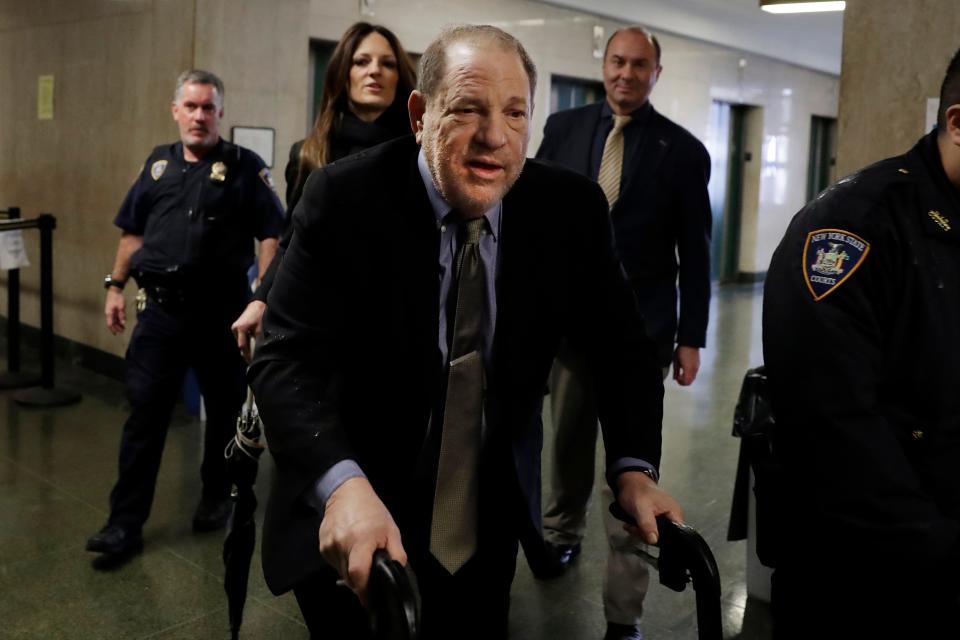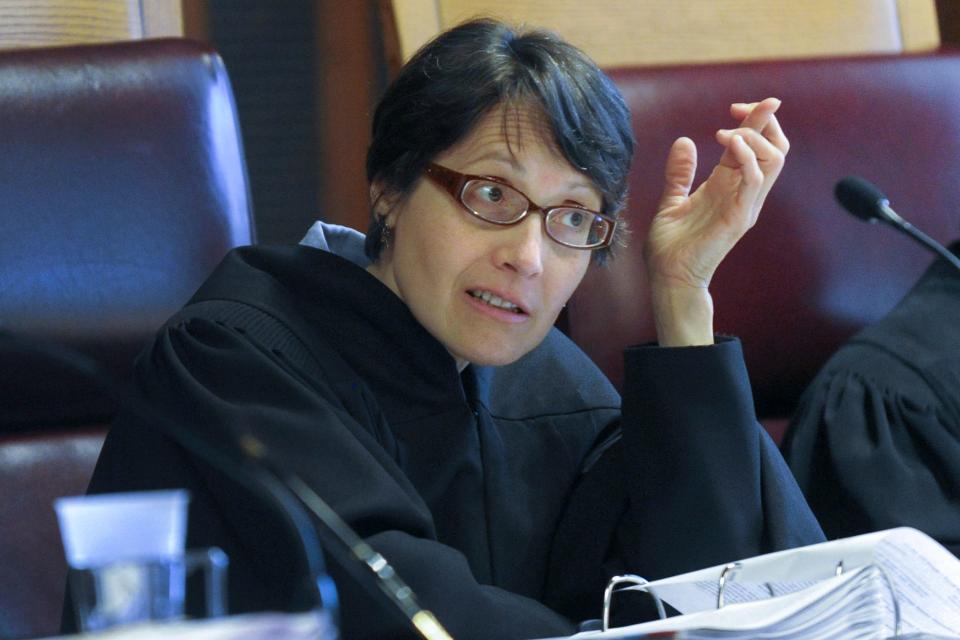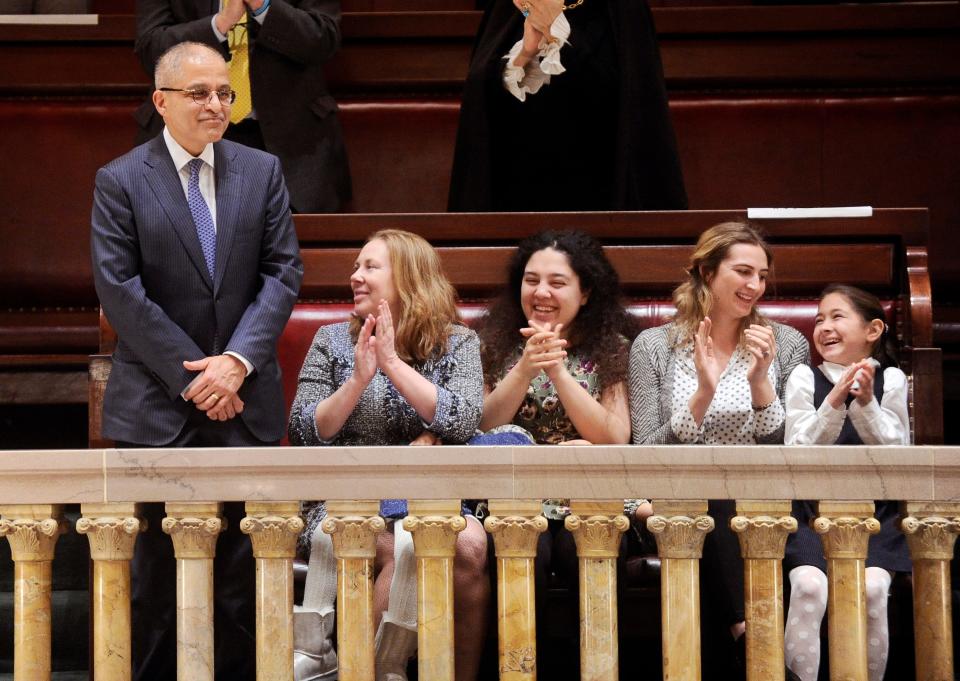NY’s highest court skeptical of Weinstein’s bid to overturn convictions. What judges said
New York state's top court on Wednesday expressed skepticism toward disgraced producer Harvey Weinstein's bid to overturn his criminal convictions.
The Court of Appeals weighed whether testimony admitted at trial may have tainted the jury against Weinstein without offering much insight into his behavior in return. If the court accepts this theory, it could overturn his convictions and order a new trial.
In 2020, Weinstein was convicted by a jury of committing a criminal sexual act in the first degree and third degree rape, with regard to two women, Miriam Haley and Jessica Mann.
Haley, a production assistant for one of Weinstein's television shows, testified that Weinstein forcibly performed oral sex on her at his SoHo apartment in 2006. Jessica Mann, an aspiring actress, said that in 2013 Weinstein blocked her exit from a Manhattan hotel room and raped her.

Three other women, Lauren Young, Dawn Dunning and Tarale Wulff, were also permitted to offer their testimony that Weinstein sexually assaulted each of them.
Weinstein was acquitted of two other legal charges that were predicated on the assaults of Haley and Mann. Justice James Burke sentenced him to 23 years in prison. He was also convicted in 2022 of rape and several other charges in relation to a 2013 incident in Los Angeles with a model-actress.
Weinstein appeal records sealed: Why is Harvey Weinstein's appeal of his criminal conviction hidden from public view?
What happened at the Court of Appeals?
Attorney Arthur Aidala, arguing on Weinstein's behalf, offered an unusually impassioned case at the high court, shouting and gesticulating wildly during oral arguments.
"They tried his character to the point where they stripped him naked," Aidala said, objecting to the testimony of the three other women who were allowed to take the stand pursuant to a legal precedent known as Molineux. Under Molineux, a judge may admit testimony about prior criminal conduct if it is used to clarify a defendant's intent, and not to imply that he has a general propensity for bad behavior.
Both sides wrestled over the use of this precedent during Wednesday’s hearing. Aidala argued that Burke, the trial court judge, let the Molineux testimony get out of hand, effectively muddling all of the women's complaints in the eyes of the jury.
Some judges appeared receptive to arguments that the trial judge may have unfairly prejudiced the jury against Weinstein. One of the court's most liberal judges, Jenny Rivera, twice asked if the Molineux case itself should be revisited, which would be a massive boon to criminal defendants and help Weinstein in his appeal.

On another critical issue — Burke's inclination to allow new, damning testimony if Weinstein were to take the witness stand — Justice Betsy Barros questioned whether Burke had been overzealous.
Barros, a lower-court judge who sat with the Court of Appeals due to two judicial recusals in the case, said that because of Burke's ruling, "I don't think anybody in their right mind would testify," noting her concern about Weinstein's right to testify in his own defense.
But the rest of the seven-judge bench didn’t make these points as aggressively, and some even rejected Aidala's arguments outright.
"The jury has a right to know" about Weinstein's conduct towards these three other women, Judge Madeline Singas, a conservative jurist and former Nassau District Attorney, told Aidala.
Could Weinstein’s conviction really be overturned?
Though the prospect of overturning Weinstein's conviction may seem remote, especially for a notorious figure who has been convicted of abusing women in multiple jurisdictions and is accused of abusing dozens more, it would not be unprecedented.
In 2021, the Pennsylvania Supreme Court threw out actor Bill Cosby's sexual assault conviction, sending shock waves through the #MeToo movement. Cosby had been convicted on three counts of aggravated indecent assault for drugging and then sexually assaulting former Temple University employee Andrea Constand. But the Pennsylvania court ruled that a prior official's promise not to prosecute Cosby for these acts was binding on the current prosecutorial team.
Weinstein's case rests on an entirely different legal theory, but it will test the same willingness from another state high court to scrutinize one of the #MeToo movement's most high-profile criminal cases.
The Court of Appeals could release its decision at any time, but the judges often decide cases the month after they are heard.
A political shift on NY’s top court
Working in Weinstein's favor is that the politics of the New York Court of Appeals have measurably shifted in recent years. After the ouster of Gov. Andrew Cuomo, facing his own allegations of sexual harassment, in 2021, Gov. Kathy Hochul took the reins of New York's Executive Chamber. Under Cuomo, the court, led by Chief Judge Janet DiFiore, ran a noted conservative streak.

Since taking office, Hochul made two new appointments to the court and elevated one of the court's liberal jurists, Rowan Wilson, to the chief judge's slot after DiFiore retired. And the court under Wilson has shown that it is particularly concerned with fairness in the administration of criminal cases.
An analysis by Albany Law School professor Vincent Bonventre shows that the number of criminal cases the Court of Appeals hears has increased substantially during Wilson's tenure. Some of the court's liberals have been explicit in their solicitude toward the rights of criminal defendants.
Weinstein’s appeal papers shielded from public
Heightening the stakes of Wednesday's arguments is the fact that all of the files and briefs in Weinstein's appeal before the high court have been sealed from public view. Court records are traditionally accessible to the press and public under the First Amendment of the U.S. Constitution.
But the clerk of the Court of Appeals refused to provide the USA Today Network New York with copies of any of the briefs in the case, making it difficult to understand the full measure of Weinstein's argument that his convictions should be tossed out, or the DA's argument for keeping him in prison. The clerk said that the appellate record was exempt from disclosure under a state law that protects the privacy of victims of sexual abuse.
The USA Today Network’s legal counsel filed a motion seeking to unseal the files in Weinstein's appeal. In a prior decision, the Court of Appeals summarily rejected the motion on procedural grounds. The USA Today Network is asking the court to revisit its decision.
In many cases, the victims have themselves come forward to describe their encounters with Weinstein and have been identified repeatedly in the press.
"It sounds like the cat is already out of the bag," David Korzenik, a lawyer and First Amendment scholar, said in a previous interview. "I see no justification for the sealing the appellate records at all, particularly if all the stuff is already out there."
Asher Stockler is a reporter for The Journal News and the USA Today Network New York. You can send him an email at astockler@lohud.com. Reach him securely: asher.stockler@protonmail.com.
This article originally appeared on Rockland/Westchester Journal News: NY’s top court skeptical of Weinstein’s bid to overturn convictions

